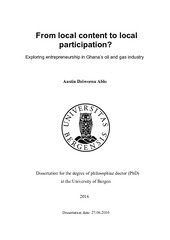| dc.contributor.author | Ablo, Austin Dziwornu | |
| dc.date.accessioned | 2016-06-30T08:31:43Z | |
| dc.date.available | 2016-06-30T08:31:43Z | |
| dc.date.issued | 2016-06-27 | |
| dc.identifier.isbn | 978-82-308-3285-1 | |
| dc.identifier.uri | https://hdl.handle.net/1956/12224 | |
| dc.description.abstract | Ghana started commercial oil production in 2010 and as part of strategies to facilitate linkages between the oil and gas industry and the Ghanaian economy, a local content law was passed in 2013. This PhD thesis examines whether and how Ghana’s local content law enhances the opportunities for local participation in the petroleum sector. With a focus on Ghanaian SMEs’ and drawing on relational perspectives in geography that emphasise the embeddedness of economic action, the thesis highlights the complex social processes that shape the impacts of natural resources extraction on society. The thesis examines Ghanaian entrepreneurs’ strategies of drawing on networks to acquire information, build trust and mobilise financial capital in their attempt to gain entry and participate in the oil and gas industry. The study argues that the social and economic capitals relevant for local entrepreneurial activities in the oil industry are relatively inaccessible for SMEs. The thesis also explores the ways in which a state-led Enterprise Development Centre (EDC) enhances the opportunities for SMEs’ participation in the oil industry. While the EDC enhances the capacities of SMEs through training, this study contends that the benefits of the EDC in terms of promoting SMEs’ participation in the oil industry are limited. With emphasis on the micro-mechanisms of power embedded in the techniques and practices of MNCs, the state and local companies, the thesis examines the emerging relations of power between actors and highlights how these influence the opportunities for SMEs participation in the oil and gas sector. Through extensive fieldwork conducted in Ghana’s oil industry over a period of three years, the study concludes that Ghana’s local content law is largely beneficial to local elites and does not stimulate broad-based social and economic benefits. The case studies of Ghana entrepreneurial activities show how embedded resources and practices of actors shape local SMEs participation in the oil and gas industry. | en_US |
| dc.language.iso | eng | eng |
| dc.publisher | The University of Bergen | eng |
| dc.relation.haspart | Paper I: Ablo A. D., Overå R. (2015) Networks, trust and capital mobilisation: challenges of embedded local entrepreneurial strategies in Ghana's oil and gas industry. The Journal of Modern African Studies 53 (3): 391-413. This article is not available in BORA. The published version is available at: <a href="http://dx.doi.org/ 10.1017/S0022278X15000385"target="blank"> 10.1017/S0022278X15000385</a> | eng |
| dc.relation.haspart | Paper II: Ablo A. D. (2015) Local content and participation in Ghana’s oil and gas industry: Can enterprise development make a difference? The Extractive Industries and Society 2 (2): 320-327. This article is not available in BORA. The published version is available at: <a href="http://dx.doi.org/10.1016/j.exis.2015.02.003"target="blank"> 10.1016/j.exis.2015.02.003</a> | eng |
| dc.relation.haspart | Paper III: Ablo A. D., Overå R. The micro-mechanisms of power in local content requirements and their constraints on Ghanaian SMEs in the oil and gas sector. Revised and resubmitted to Review of African Political Economy. Manuscript. This article is not available in BORA. | eng |
| dc.title | From local content to local participation? Exploring entrepreneurship in Ghana’s oil and gas industry | eng |
| dc.type | Doctoral thesis | en_US |
| dc.rights.holder | Copyright the author. All rights reserved. | en_US |
| dc.identifier.cristin | 1372315 | |
